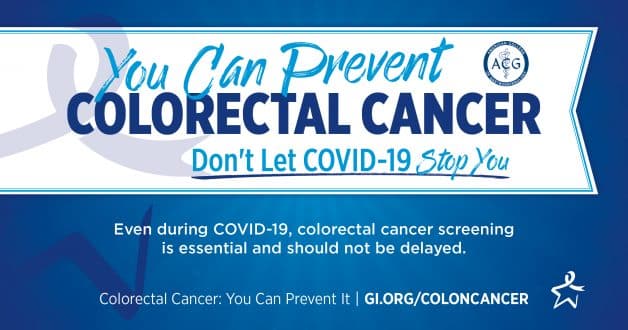The Who, What, Why, and How of Colorectal Cancer Screening
Did you know that March is Colorectal Cancer Awareness Month?
We are taking action all month long to help promote the importance of colorectal cancer screening. Read on to learn more about screening and find out how to get involved with helping to spread awareness!

Who should get screened for colorectal cancer?
In the most recent update to the American Cancer Society (ACS) guidelines, the ACS recommends that people at average risk for colorectal cancer start screening at age 45. This is lower than other recommendations of age 50.
The guidelines also recommend that those at average risk should continue regular screening through the age of 75, if they are expected to live at least 10 more years. Those 76 to 85 should then work with their healthcare providers to determine if they should continue to get screened on a regular basis. Those over 85 do not need to continue screening.
People at higher risk for colorectal cancer may need to start screening before the age of 45.
Those who are at higher risk include people with a strong family history or personal history of colorectal cancer or certain types of polyps and those with a family history of hereditary cancer syndromes such as Lynch syndrome or familial adenomatous polyposis (FAP).
People with inflammatory bowel disease (ulcerative colitis or Crohn’s disease) are also considered higher risk.
Your healthcare provider can help determine your risk for colorectal cancer. They can also advise on when you should start regular screening and what type of test is best for you.
What tests are used to screen for colorectal cancer?
Many people are aware of the colonoscopy test, but there are actually a variety of screening tests available for colorectal cancer.
A colonoscopy is used to check for polyps (or abnormal growths) and cancer inside the rectum and the entire colon. The doctor performing the colonoscopy may remove polyps during the test.
There is also a test called a flexible sigmoidoscopy that is similar to a colonoscopy, but it can only be used to check the rectum and lower third of the colon.
There are stool tests available that can detect either blood or cancer cells in the stool, depending on the test. Lastly, a “virtual colonoscopy” has been developed that uses X-rays and computers to create an image of the entire colon.
While the less invasive tests may seem like an easier option, it’s always essential to follow your doctor’s recommendations on the right screening test for you. If a screening test shows anything unusual, then it will ultimately be followed up by a colonoscopy.
Why should I get screened?
According to the CDC, “not counting some kinds of skin cancer, colorectal cancer is the third leading cause of cancer-related deaths in the United States.”
While this number may sound grim, the death rate from colorectal cancer has actually been dropping. This is likely due to early detection and treatment, so don’t wait to get screened!
How can I get screened for colorectal cancer?
It’s never too early to start the conversation about colorectal cancer screening with your primary care provider or gastroenterologist. Even if you think you are too young to get screened, your doctor can help determine if you need to start screening earlier.
Click here to learn how you can get involved during Colorectal Cancer Awareness Month and beyond!
Remember: Educating yourself and your loved ones about colorectal cancer screening can help save lives!
Related Resources:
Listen to our
latest Podcast!





